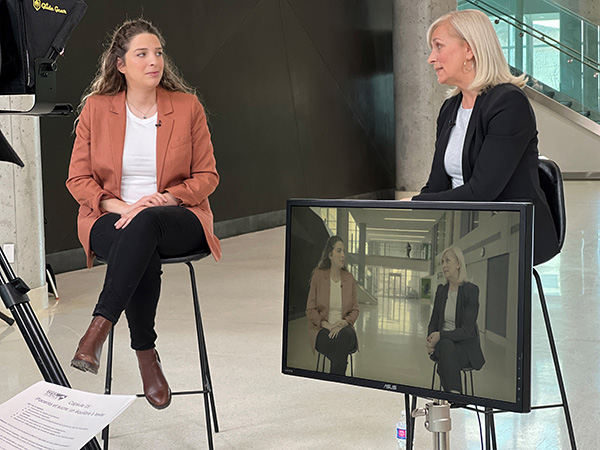A one-stop shop for a healthy pregnancy backed by science

Most of us take medication regularly. Pain relievers like acetaminophen are staples in medicine cabinets across Canada. And more than half of us rely on prescription medications like antidepressants, anti-seizure drugs, or insulin to treat diabetes.
But what happens if you're pregnant? Should you continue taking your medication as usual?
A team of more than 70 researchers, health care providers, trainees, and knowledge users from across the country have come together to inform these decisions as part of the Healthy Pregnancy Hub based at Centre hospitalier universitaire Sainte-Justine. Their mission? To be a one-stop resource providing research-backed information on the benefits and risks of medication use during pregnancy.
"Women don't really know what to do," says Dr. Anick Bérard, lead researcher of the hub. "Seventy-five percent of pregnant women will use a medication during pregnancy – it could be antibiotics to treat a urinary tract infection, or an antidepressant. They need information."
A quick Google search about medication and pregnancy reveals a slew of conflicting information, with some sites instructing pregnant people to avoid medication altogether. "It's very easy to access misinformation," says Émy Roberge, coordinator of the hub. To counter the abundance of misinformation available online, the Healthy Pregnancy Hub provides accessible and reliable resources to help individuals engage in informed conversations with their health care providers and make the best decisions for their health.
The hub follows a rigorous process to ensure the information they share is accurate and reliable. First, an army of trainees reviews the scientific literature available on a given topic. This information is then used to create digestible resources such as fact sheets, videos, and podcasts, validated by experts and shared through the hub. Knowledge gaps are relayed to the research arm of the hub, Canadian Mother-Child Cohort, to generate new evidence.
There is a particular gap in information on medication use during pregnancy among Black communities, Indigenous Peoples, newcomers to Canada, and members of the 2SLGBTQI+ community. To fill this gap, Dr. Bérard and her team are collaborating directly with these groups to develop resources that reflect their lived experiences. Their input also informs the research arm of the hub, ensuring that more inclusive and representative scientific evidence is generated.
The Healthy Pregnancy Hub has already shared fact sheets on more than 40 commonly used medications during pregnancy, with many more to come. As the hub continues to grow, it is empowering individuals to make informed decisions about their health.
At a glance
Issue
Seventy-five percent of Canadians will use medication during pregnancy, but finding reliable, research-backed information about what medications are safe to use during pregnancy can be challenging.
Research
Dr. Anick Bérard and her Healthy Pregnancy Hub team are providing accessible information based on scientific research about medications during pregnancy.
- Date modified: